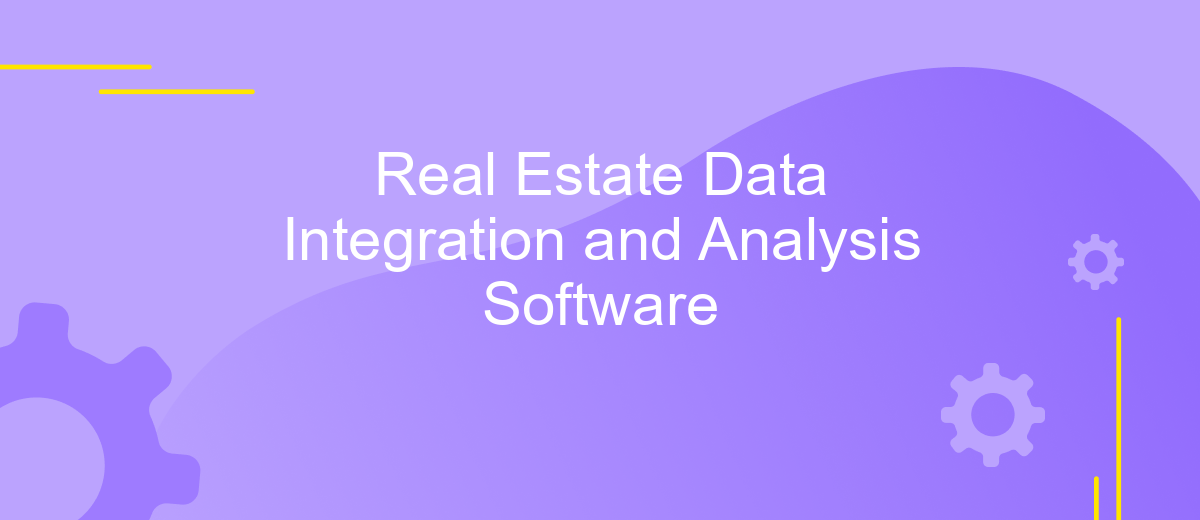Real Estate Data Integration and Analysis Software
In today's rapidly evolving real estate market, the ability to seamlessly integrate and analyze diverse data sets is crucial for gaining a competitive edge. Real estate data integration and analysis software provides powerful tools to consolidate information from various sources, enabling professionals to make informed decisions. By leveraging cutting-edge technology, this software enhances efficiency, accuracy, and strategic planning, ultimately transforming the way real estate businesses operate.
Introduction: The Importance of Data Integration in Real Estate
In the rapidly evolving real estate market, data integration plays a crucial role in streamlining operations and enhancing decision-making. As the industry becomes more data-driven, the ability to consolidate diverse data sources into a unified platform is indispensable. Real estate professionals rely on accurate and timely information to make informed decisions, and integrating data from various channels—such as property listings, market trends, and customer insights—can significantly boost efficiency and productivity.
- Improved decision-making through comprehensive data analysis
- Enhanced operational efficiency by reducing data silos
- Increased transparency and accuracy in reporting
- Better customer insights and personalized service offerings
By leveraging data integration, real estate companies can gain a competitive edge in the market. This integration not only facilitates a holistic view of the business landscape but also empowers stakeholders with actionable insights. As data continues to grow in volume and complexity, the importance of robust data integration solutions cannot be overstated. Embracing these technologies is essential for staying ahead in the competitive real estate sector.
Key Features of Effective Real Estate Data Integration and Analysis Software

Effective real estate data integration and analysis software must seamlessly consolidate data from diverse sources, ensuring a unified and comprehensive view. By automating data collection and synchronization, it eliminates manual entry errors and saves valuable time. Key features include robust data mapping and transformation capabilities, which allow users to customize how data is integrated and displayed. This adaptability is crucial for addressing the unique needs of different real estate markets and organizations.
Advanced analytics tools are essential for extracting actionable insights from integrated data. These tools should support predictive analytics, trend analysis, and real-time reporting, enabling informed decision-making. Additionally, the software must offer secure data storage and sharing, safeguarding sensitive information. For enhanced integration, services like ApiX-Drive can be utilized, providing a user-friendly interface for setting up and managing integrations without technical expertise. This streamlines the process, ensuring seamless connectivity between various applications and platforms, ultimately enhancing operational efficiency and strategic planning in the real estate sector.
Benefits of Using Real Estate Data Integration and Analysis Software

Integrating and analyzing real estate data is crucial for making informed decisions in today's competitive market. Real estate data integration and analysis software offers a streamlined approach to managing vast amounts of data from multiple sources, providing a comprehensive view of market trends and property performance. This technology not only enhances decision-making but also optimizes operational efficiency.
- Centralized Data Management: By consolidating data from various platforms, users can access all relevant information in one place, reducing the time spent on data retrieval.
- Improved Accuracy: Automated data integration minimizes human errors, ensuring that the information used for analysis is accurate and up-to-date.
- Enhanced Analytical Insights: Advanced analytical tools provide deeper insights into market trends, helping investors and real estate professionals make strategic decisions.
- Cost Efficiency: By automating data processes, companies can reduce operational costs and allocate resources more effectively.
- Scalability: As businesses grow, the software can scale to accommodate increasing data volumes without compromising performance.
Incorporating real estate data integration and analysis software into business operations not only boosts productivity but also provides a competitive edge. By leveraging this technology, professionals can anticipate market changes, identify investment opportunities, and ultimately drive growth and success in the real estate sector.
Choosing the Right Real Estate Data Integration and Analysis Software for Your Needs

When selecting real estate data integration and analysis software, it's crucial to consider your specific needs and objectives. The right software should streamline your operations, enhance decision-making, and provide actionable insights. Begin by assessing the volume and types of data you handle, as well as the complexity of your analysis requirements.
Next, evaluate the software's compatibility with your existing systems and its ability to scale as your business grows. Consider the ease of use and the level of support offered by the vendor. User-friendly interfaces and comprehensive customer support can significantly impact your experience.
- Determine your budget and compare it with the software's pricing structure.
- Check for features like data visualization, reporting tools, and integration capabilities.
- Read reviews and request demos to gauge user satisfaction and software performance.
Ultimately, the best software will align with your business goals, offering flexibility, reliability, and robust analytical tools. By carefully evaluating your options and considering future needs, you can choose a solution that enhances your real estate operations and drives success.
Future Trends in Real Estate Data Integration and Analysis
The future of real estate data integration and analysis is poised for significant transformation, driven by advancements in artificial intelligence and machine learning. These technologies will enable more sophisticated data processing, allowing for predictive analytics that can forecast market trends and property values with greater accuracy. As the demand for real-time data increases, cloud-based solutions will become more prevalent, offering scalable and flexible platforms for data integration. This shift will empower real estate professionals to make informed decisions swiftly, enhancing their competitive edge in a dynamic market.
Moreover, the integration of diverse data sources will be streamlined through innovative services like ApiX-Drive, which simplifies the process of connecting various applications and automating data workflows. This will facilitate seamless data exchange between real estate platforms, enhancing operational efficiency. As privacy concerns grow, there will be a stronger emphasis on secure data handling and compliance with regulations. Ultimately, these trends will lead to a more connected and intelligent real estate ecosystem, where data-driven insights drive strategic decision-making and optimize property management.
FAQ
What is Real Estate Data Integration and Analysis Software?
How does data integration benefit real estate businesses?
What features should I look for in Real Estate Data Integration and Analysis Software?
How can I automate data integration in real estate?
Is it possible to customize Real Estate Data Integration and Analysis Software for specific needs?
Do you want to achieve your goals in business, career and life faster and better? Do it with ApiX-Drive – a tool that will remove a significant part of the routine from workflows and free up additional time to achieve your goals. Test the capabilities of Apix-Drive for free – see for yourself the effectiveness of the tool.

